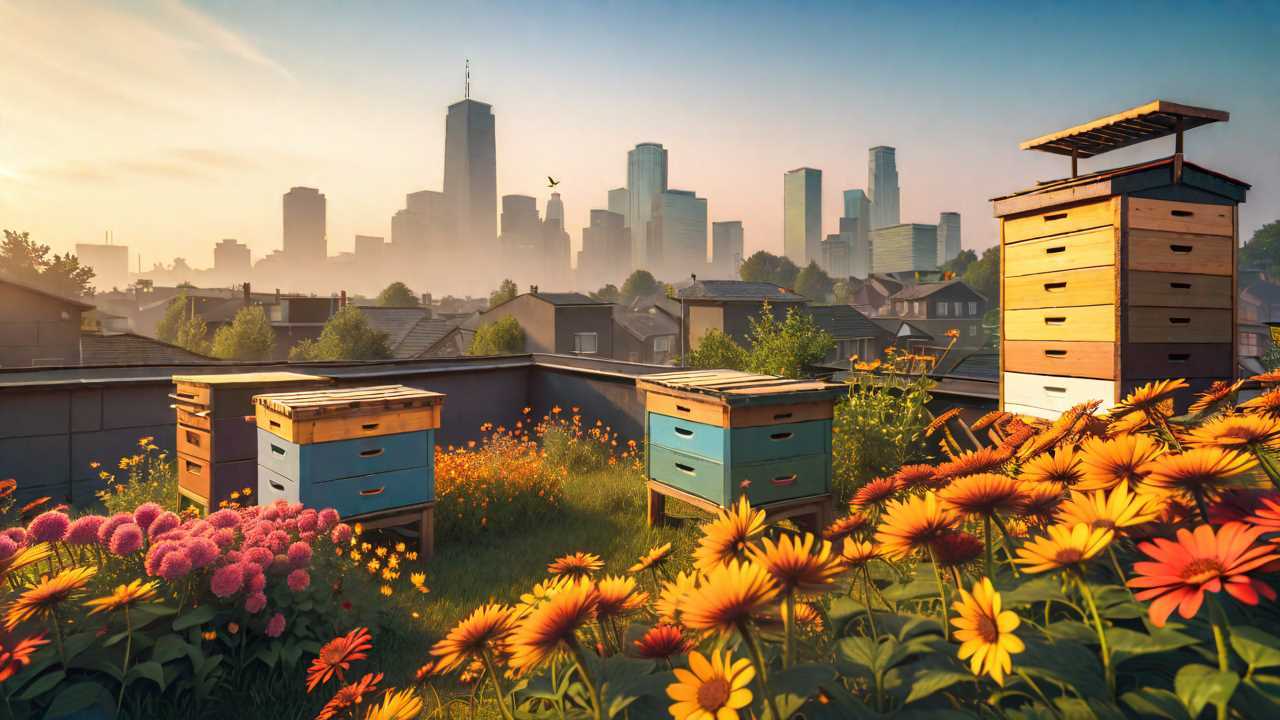
Urban beekeeping can significantly boost the productivity of your community garden by providing essential pollination services to your plants. The presence of beehives in urban areas not only increases the yield of fruits and vegetables but also improves their quality, making them more nutritious and flavorful. However, the benefits of urban beekeeping extend far beyond just agricultural advantages.
Urban beekeeping actively contributes to promoting biodiversity and enhancing ecosystem health by encouraging the presence of diverse plant species and increasing pollination rates within urban environments.
Bees play an essential role in maintaining plant diversity by pollinating a wide range of flowering plants, which in turn supports various animal species dependent on these plants for food and habitat.
The presence of bees in urban areas helps to create microhabitats that attract other pollinators and beneficial insects, further enriching the local ecosystem.
Additionally, the increased pollination rates facilitated by urban beekeeping lead to improved fruit and seed set in plants, ultimately boosting overall plant reproduction.
This is particularly important in urban environments where green spaces may be limited, as it promotes the continued growth and sustainability of plant populations.
Boosts Urban Agriculture and Food Security
Enhancing urban agriculture and ensuring food security are significantly strengthened through the practice of beekeeping in cities. Urban beekeeping plays a pivotal role in supporting local agriculture by enhancing crop yields and quality. Bees are essential pollinators for many fruits, vegetables, and nuts grown in urban areas. Through their pollination services, bee colonies contribute to the production of a wide variety of crops, thereby increasing the overall food supply within cities.
Additionally, urban beekeeping promotes food security by diversifying the sources of local food production. By having beehives in urban settings, cities can reduce their dependence on external sources for certain food items, thereby creating a more resilient and sustainable food system. This increased local food production not only provides fresher and healthier options for urban dwellers but also helps in mitigating potential disruptions in the global food supply chain.
Enhances Pollination of Local Flora
The presence of bees in urban areas significantly improves the pollination of local flora, essential for the reproduction and abundance of plant species. Bees are efficient pollinators due to their foraging behavior and specialized body structures that aid in pollen collection and transfer. As bees visit flowers in search of nectar and pollen, they inadvertently transfer pollen grains between plants, facilitating fertilization and seed production. This process is important for the successful reproduction of many plant species, including fruits, vegetables, and flowering plants.
Urban beekeeping plays an important role in ensuring the pollination of urban gardens, parks, and green spaces. By maintaining beehives in urban areas, beekeepers provide local flora with a reliable source of pollinators, leading to increased fruit and seed set. This, in turn, contributes to the overall health and biodiversity of urban ecosystems. Additionally, enhanced pollination can result in higher crop yields and improved quality of fruits and vegetables grown in urban settings.
Fosters Community Engagement and Education
Fostering community engagement and education through urban beekeeping involves creating opportunities for hands-on learning and collaboration among individuals interested in sustainable practices and ecosystem conservation. Beekeeping in urban settings serves as a platform for community members to come together, exchange knowledge, and work towards a common goal of supporting pollinators and biodiversity.
Engaging in beekeeping activities allows community members to gain a deeper understanding of the vital role bees play in our ecosystem. By learning about bee behavior, hive management, and honey production, individuals develop a newfound appreciation for these essential pollinators. Through workshops, demonstrations, and hive visits, urban beekeepers can share their expertise with others, fostering a culture of learning and environmental stewardship within the community.
Furthermore, urban beekeeping initiatives often lead to the establishment of community gardens and green spaces that benefit both bees and local flora. These projects not only enrich urban biodiversity but also provide opportunities for community members to actively participate in sustainable practices that promote a healthier environment for all.
Frequently Asked Questions
Can Urban Beekeeping Attract Pests Like Wasps or Hornets?
Urban beekeeping can attract pests like wasps or hornets due to the presence of beehives. These insects may compete for resources or even attack the bees. Proper management and monitoring can help mitigate these potential issues.
Do Urban Beekeepers Need Special Permits or Licenses?
Urban beekeepers typically need special permits or licenses due to regulations aimed at ensuring safety, proper beekeeping practices, and environmental protection. It is essential to obtain the necessary documentation before starting your beekeeping venture.
How Do Bees in Urban Areas Fare During Winter Months?
During winter in urban areas, bees rely on stored honey for energy. They cluster together to maintain warmth and protect the queen. Adequate insulation, nearby food sources, and beekeeper assistance can help them survive harsh conditions.
What Types of Flowers Are Best for Urban Beekeeping?
To support urban beekeeping, prioritize planting native flowers like lavender, sunflowers, and rosemary. These species offer rich nectar and pollen sources, aiding bee health. Consider the bloom seasons to guarantee a continuous food supply for your bees.
Are There Any Health Risks Associated With Urban Beekeeping?
When considering health risks in urban beekeeping, it's essential to understand potential bee sting allergies, the importance of protective gear, and proper hive maintenance to minimize any dangers. Stay informed and safe.
 SportsHollywoodLifestyleFashionHome & GardenTrendsPrivacy PolicyTerms And Conditions
SportsHollywoodLifestyleFashionHome & GardenTrendsPrivacy PolicyTerms And Conditions
